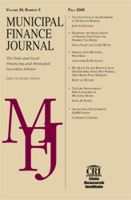The Fiscal Impact of Local-Option Taxes on Municipalities: The Case of Massachusetts
Author: Bo Zhao.
Source: Volume 31, Number 04, Winter 2011 , pp.63-86(24)

< previous article |next article > |return to table of contents
Abstract:
This paper examines the impact of local-option taxes on meals, sales, income, and payroll on revenue-raising capacity of municipalities, using new data from Massachusetts. Local-option taxes help municipalities generate considerable additional revenues. However, revenue capacity from local-option taxes is not evenly distributed across the state. On average, large cities would benefit more from local sales, meals, and payroll taxes, and high-income, property-rich municipalities would gain more local-option tax capacity than low-income, property-poor municipalities. Local-option taxes do not compensate municipalities in proportion to their recent loss of state aid dollars and are not likely to mitigate fiscal disparities. This paper proposes that the state change aid formulas to reflect differences across municipalities in local-option tax capacity and to better target fiscally distressed communities. This strategy could also be useful in other states beyond Massachusetts.Keywords: Representative tax system; local-option tax capacity; fiscal disparity
Affiliations:
1: Federal Reserve Bank of Boston.